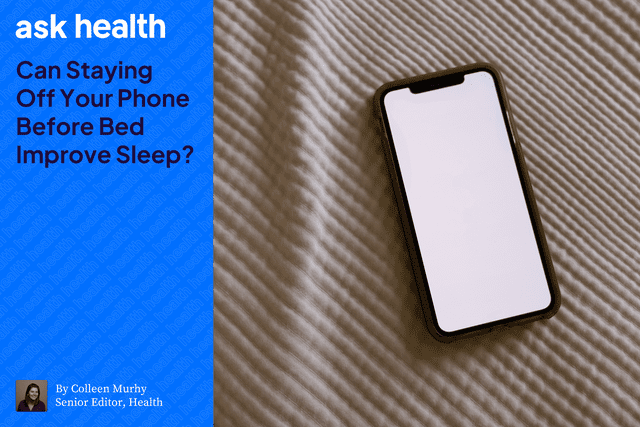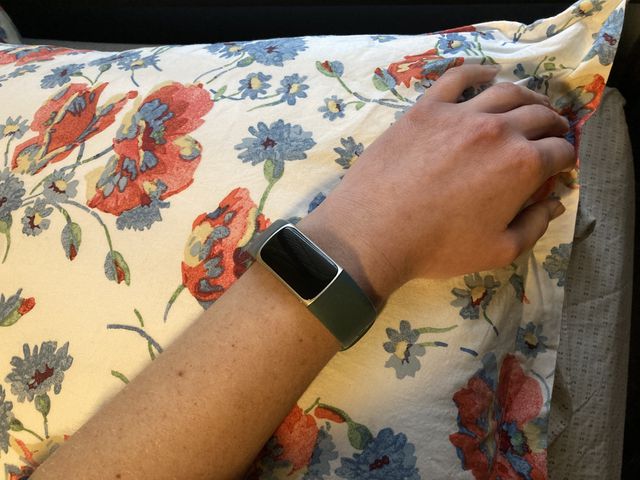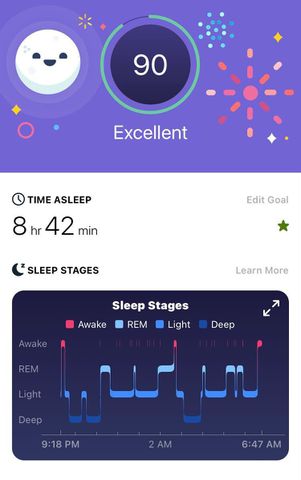Medically reviewed by Daniel Combs, MD
- Getting enough good-quality sleep is essential to your overall health and well-being.
- Using your phone before bed can disrupt the quality and quantity of your sleep. The device’s blue light and stimulating content can make you less sleepy.
- I’ve realized using my phone before bed has negatively affected my sleep and quality of life.
- I kept my phone out of my bedroom for 30 days and found I benefitted from it.
Ah, 10:30 p.m. I’m proud of myself for getting to bed at a decent time. Except, just because I’m getting into bed at 10:30 doesn’t mean I’m going to sleep at 10:30.
The truth is, I might be on my phone for a couple more hours.
Whether I was scrolling through TikTok, clicking through so many Wikipedia links I forgot which page I even started on, or Googling the science behind why my hair has gotten darker over time (it turns out hormonal changes that affect hair-pigment protein might be to blame), I realized that having my phone in my bed was preventing me from getting the recommended seven or more hours of sleep a night.
As a Health editor who regularly edits articles about sleep, I know how important getting enough sleep is. A lack of quality sleep can negatively affect your mood the next day and also make you feel less alert and more sluggish. Over time, not getting enough sleep can put you at increased risk for chronic conditions like high blood pressure (hypertension) and heart disease. Long-term poor sleep can also lead to depression and less physical activity.
My phone was certainly cutting into my bedtime, but was it making the quality of my sleep poor as well?
To figure out whether my phone was wrecking my sleep, I chose to keep the device away from my bed for 30 days. Not only was it out of arm’s reach, my phone wasn’t even in my bedroom or on the same floor. When I went up to bed, I left my phone downstairs. Over those 30 days, I tracked my sleep quantity and quality and compared the measurements to the previous 30 days. I also noted any changes I experienced in my quality of life or well-being.
Here’s what happened throughout the testing period. (Spoiler: I think going phone-free before bed is something more people should try.)

Design By Health / Catherine McQueen / Getty
How Can Using Your Phone Before Bed Affect Sleep?
Electronic usage is one factor that can affect the duration and quality of your sleep. I spoke with Molly Atwood, PhD, assistant professor of psychiatry and behavioral sciences at Maryland’s Johns Hopkins University, about the science behind why your phone can hurt your sleep. She broke the explanation down into two reasons.
One reason using your phone before bed can have a negative impact on sleep has to do with our circadian rhythm, the body’s sleep-wake clock. Everyone’s body has a preferred time to fall asleep and wake up. About two hours before your body’s preferred fall-asleep time, your brain releases the hormone melatonin, which cues your body to wind down and prepare for sleep. But blue light emitted from smartphones, tablets, and computers can suppress the release of melatonin and prevent your body from winding down enough for sleep.
Another way Atwood said smartphones can disrupt sleep is by interfering with your arousal system, which is responsible for producing sleepiness. Because phones and their apps can excite the brain, the devices can trigger the arousal system, preventing you from falling asleep.
Research has shown that spending just 30 minutes on any kind of electronic device within two hours of bedtime causes a decrease in sleep quality. And the longer you use the device within those two hours, the poorer your sleep will likely be.
How I Tracked My Sleep
To track the effect of not using a phone in bed, I wore a Fitbit to sleep. I wear the activity tracker on my wrist 24/7, so this was nothing new for me. The watch measures certain aspects of your sleep and sends the information to an app, where the stats are automatically logged. I looked at three of the tracked measurements to gauge my sleep quality:
- Time I fell asleep
- Hours slept
- Sleep score
Sleep score is a number out of 100 the tracker gives you after each night of sleep. The score is based on heart rate, time spent awake or restless, and percentage of sleep spent in each stage of sleep. Fitbit considers a sleep score of 90 or above excellent. Good is 80-89, fair is 60-79, and poor is less than 60.

Colleen Murphy
Besides looking at my app to see how my previous night’s sleep went, I also listened to my body. I took note of how tired I felt upon waking up and throughout the day as well as what my athletic performance was like each day.
My Sleep Measurements Before the Test
In the 30 days prior to the test, there were 13 times I went to bed past midnight—four of those times past 1 a.m. and four other times past 2 a.m. I think part of that was because I knew this test was coming, and I wanted to take advantage of my phone before bed while I could. Even though I knew it was likely bad for me, it was something I enjoyed doing.
There were 12 days I didn’t reach the recommended seven hours of sleep.
My sleep measurements for that month were as follows:
Median time I feel asleep: 11:58 p.m.
Average hours slept: 7 hours, 5 minutes
Average sleep score: 78, fair
The Test
For the 30 days of the test, I chose to keep my phone downstairs. I knew if I brought it upstairs with me, I’d use the phone while brushing my teeth. Or if I used it as my alarm clock, I might sneak a peek at a text when setting my alarm. I wanted to truly wind down and not have my phone disrupt my melatonin release or get my mind racing in the time leading up to bed.
Here’s how it went, week by week:
Week 1
The first week of not using my phone before bed felt like the worst sleep I’ve ever had. Although it was quite freeing to not have my phone with me, I struggled with sleep anxiety that first week. Sleep anxiety is a feeling of worry or stress about falling and staying asleep. I knew I was expected to get good sleep for the test so I was anxious I wouldn’t—and because I was anxious, I couldn’t sleep.
I felt the effects of my sleep anxiety the following day most days that week. My eyes felt tired during the day, and my exercise performance was lackluster. I swim, and I felt sluggish in the water.
Still, my sleep measurements had actually improved from the month prior. My sleep score increased, I was falling asleep earlier, and I was sleeping more each night. There was just one night in the first week I didn’t get the recommended seven hours of sleep.
Week Recap:
- Median time I feel asleep: 11:34 p.m.
- Average hours slept: 7 hours, 57 minutes
- Average sleep score: 80, good
Week 2
Thankfully, by the second week, my sleep anxiety disappeared as I had gotten used to the idea of tracking my sleep. However, now that I was going to sleep earlier, I wasn’t sure when I should wake up.
At the start of the week, I tried to let my body tell me when to wake up. Doing this, I was waking earlier than usual and feeling a bit groggy. While some grogginess upon waking can be normal for people, it is not a norm for me. Being abnormally groggy, I figured I needed more sleep and stayed in bed to rest. But I wound up being in that weird in-between state of awake/not awake instead.
Since a consistent sleep-wake time is best for sleep hygiene anyway, I figured I should set an alarm so I could wake up at the same time every day. My phone had been my alarm. Instead of using the excuse of, “Well I have to bring my phone back in my room because it’s my alarm,” I used the alarm on my Fitbit. And a surprise plus: The Fitbit vibrating alarm is a lot less jarring than the phone alarm.
This week, I got the highest sleep score I’ve maybe ever gotten—90, excellent. Each morning, I felt ready to take on the day, and had successful workouts.
Week Recap:
- Median time I feel asleep: 11:39 p.m.
- Average hours slept: 7 hours, 12 minutes
- Average sleep score: 80.7, good

Colleen Murphy / Fitbit
Week 3
Success continued in the third week. For the weekend, I was staying in a hotel. The air quality in the hotel was poor and made me sick, so I woke up throughout the night to blow my nose. While my stuffy nose fragmented my sleep, my phone did not, for even on vacation I didn’t use my phone before bed.
With no phone but a stuffy nose, sleep measurements were mixed. I spent less time asleep, yet my sleep score was the highest weekly score yet. I felt well-rested upon waking and fully alert throughout the days.
Week Recap:
- Median time I feel asleep: 11:49 p.m.
- Average hours slept: 6 hours, 47 minutes
- Average sleep score: 82.3, good
Week 4
By the last week, I had fully bought into not using a phone in bed. I found myself getting tired earlier, and I looked forward to bed because it was my time to truly separate and relax. I had replaced my phone with a book—although I didn’t stay awake reading for nearly as long as I’d stayed awake scrolling.
But now that I had a more regular sleep-wake schedule, I was putting pressure on myself to get to bed around the same time each night. After talking to Atwood, I now know I don’t have to stress about my sleep so much every night.
“If you don’t get enough sleep one night, our body is actually built to be able to compensate for that without us doing anything,” Atwood said. “So if you get a poor night of sleep one night, your body will try to recover by spending more time in deep sleep the following night to try to get you more rest.”
This week, the time I spent asleep was back up. My average sleep score was solid, and the time I fell asleep stayed pretty consistent.
Week Recap:
- Median time I feel asleep: 11:44 p.m.
- Average hours slept: 7 hours, 22 minutes
- Average sleep score: 81.5, good
Results
By not using my phone in bed, my sleep measurements all improved from the month prior.
My sleep measurements for the test month as a whole were as follows:
Median time I feel asleep: 11:49 p.m.
Average hours slept: 7 hours, 21 minutes
Average sleep score: 81, good
The median time I fell asleep was nine minutes earlier than what it was when I had used my phone. I also had a more consistent sleep-wake time, with no nights where I went to bed after 2 a.m. There was a 16-minute increase in the time I spent asleep. My average sleep score was a three-point improvement that pushed my overall average score from fair to good. I felt well-rested more often.
Keeping the phone out of bed improved not only my quality of sleep, but also my quality of life. I felt better mentally. I was no longer feeling disappointed in myself—something I experienced by staying up late on my phone. I felt freer and less tied to my phone.
My phone screen time was also down. This was largely because I wasn’t using the phone before bed and partly because I wasn’t using the phone first thing in the morning. I was also just overall less interested in my phone during the day. I ended up cutting an hour off of my daily screen time average, going from 3 hours and 50 minutes to 2 hours and 49 minutes.
I felt like my schedule was more open. By going to bed earlier, I woke up earlier. By waking up earlier, I was able to exercise before work. Completing my physical activity in the morning, my nights were free to do whatever else. I went from reading 2.5 books the month prior to 4.5 books during the test month.
Going Forward
Not using my phone in bed was a positive experience and one that I have tried to continue. I do bring the phone upstairs with me now; it’s nice to have access to my phone in the morning. Afterall, Atwood said exposing yourself to blue light in the morning might actually help you wake up.
Still, I try to limit my usage before bed. When I do use my phone in bed, I’ll put it on do not disturb so texts don’t stimulate my brain or fragment my sleep. I’ll also put the phone in night shift mode so that as much blue light is blocked as possible.
When I feel like I’m reverting too much back to my old habits and using the phone for too long, I think of how well I felt during this 30-day test and put it away.
I suggest you try going phone-free before bed to see if it can positively affect your sleep and life, too. It can be a hard habit to break, but the results are worth it.
Colleen Murphy is a senior editor at Health. She was fortunate to have good sleep hygiene up until a few years ago, when she started using her phone more before going to bed. As a health editor who edits stories about sleep hygiene, she knew what she was doing to herself wasn’t in her best interest. She stopped using her phone before bed to see if it had an impact on her sleep hygiene and quality of life.
Read the original article on Health.com.
News Related-
AWS and Clarity AI to use generative AI to boost sustainable investments
-
Ref Watch: 'Enough' of a foul to disallow Man City goal vs Liverpool
-
Day in the Life: Ex-England rugby star on organising this year's Emirates Dubai Sevens
-
Pandya returns to MI, Green goes to RCB
-
Snowstorm kills eight in Ukraine and Moldova, hundreds of towns lose power
-
‘This is why fewer Sikhs visiting gurdwaras abroad’: BJP after Indian envoy heckled in Long Island
-
Inside a Dubai home with upcycled furniture and zero waste
-
Captain Turner aims for Pitch 1 return as JESS bid to retain Dubai Sevens U19 crown
-
No Antoine Dupont but Dubai still set to launch new era for sevens
-
Why ESG investors are concerned about AI
-
Your campsite can harm the environment
-
Mubadala, Saudi Fund deals on US radar for potential China angle
-
Abu Dhabi T10 season seven to kick off with thrilling double-header
-
Eight climate fiction, or cli-fi, books to consider before Cop28
